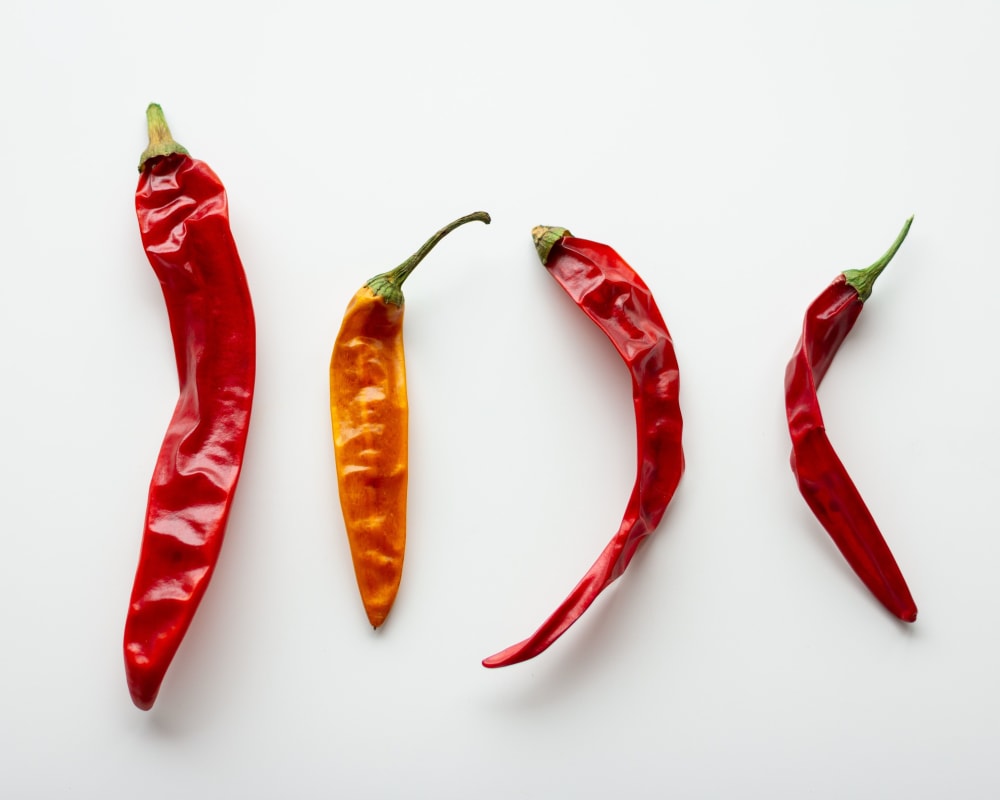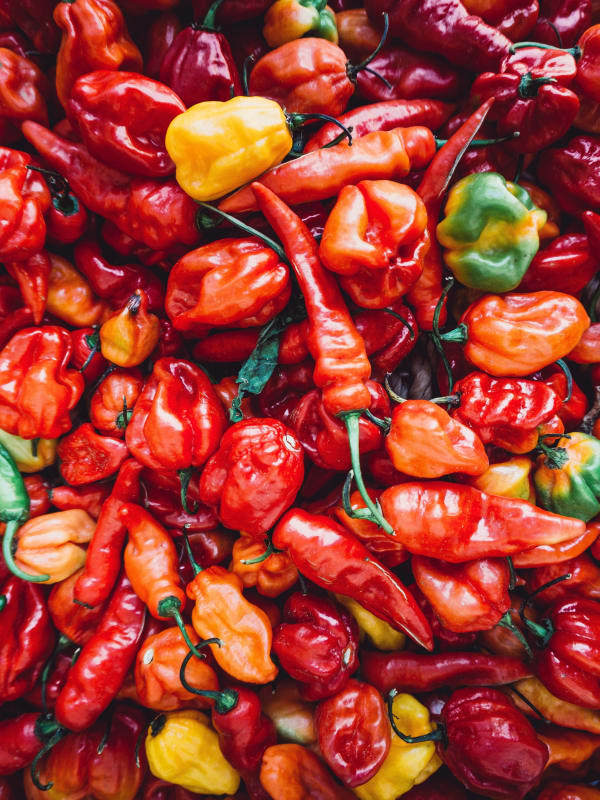Popular Conditions & Diets

We all have someone in our family who puts hot sauce on everything. As we watch them sweat through yet another plate of recklessly spicy food, we might wonder, "What's going to happen to this uncle, this cousin, this sister? Will they live past 100 or smoulder their way into an early grave?"
Capsaicin is the active component of chili peppers that gives them their signature heat. Looking at the scores of scientific research studies on capsaicin's effects on the human body might provide some insights into, broadly speaking, whether or not spicy food is good for us.
When it comes to the benefits of capsaicin, some of them may not be very surprising:
Capsaicin often appears in topical pain relief creams and ointments, and for a good reason: it works! A 2018 study comparing topical NSAIDs (non-steroidal anti-inflammatory drugs) to capsaicin cream found them equally effective for pain relief in osteoarthritis sufferers!
It was once thought that spicy foods could cause stomach or intestinal ulcers. It's probably not a good idea to gorge on the hot stuff if you already have an ulcer. But in terms of prevention, it may surprise you that h.pylori, the bacteria responsible for most ulcers, is actively antagonized by chili pepper consumption!
But if all this info has you yawning and you just want to know if eating spicy food is generally healthy or not, there is one incredible oft-cited study that may be all we need to answer the question at hand.

In 2015 the British Medical Journal published a massive Chinese cohort study following 290,000 women and 200,000 men. The study tracked all-cause mortality associated with spicy food intake and specific causes of death over seven years.
So if you don't eat spicy food whatsoever, you might consider incorporating it into your diet to your comfort level. And if you love spicy food but feel guilty indulging in it - don't!
As far as generalizations can ever be made, given that we are all unique, it seems to be a safe and science-backed claim that, Yes, spicy food is good for you.
Lv, J., Qi, L., Yu, C., Yang, L., Guo, Y., Chen, Y., Bian, Z., Sun, D., Du, J., Ge, P., Tang, Z., Hou, W., Li, Y., Chen, J., Chen, Z., & Li, L. (2015). Consumption of spicy foods and total and cause specific mortality: Population based Cohort Study. BMJ. https://doi.org/10.1136/bmj.h3942
Mhaskar, R. S., Ricardo, I., Azliyati, A., Laxminarayan, R., Amol, B., Santosh, W., & Boo, K. (2013). Assessment of risk factors of helicobacter pylori infection and peptic ulcer disease. Journal of global infectious diseases, 5(2), 60–67. https://doi.org/10.4103/0974-777X.112288
Persson, M. S. M., Stocks, J., Walsh, D. A., Doherty, M., & Zhang, W. (2018). The relative efficacy of topical non-steroidal anti-inflammatory drugs and capsaicin in osteoarthritis: A network meta-analysis of Randomised Controlled Trials. Osteoarthritis and Cartilage, 26(12), 1575–1582. https://doi.org/10.1016/j.joca.2018.08.008

Excessive amounts of capsaicin have been shown to increase intestinal permeability, aka leaky gut. However, moderate amounts of spiciness in the diet improve the integrity of the gut while promoting a variety of beneficial microbes. Hot chili peppers even reduce nasty microbes and pro-inflammatory mechanisms in the small intestine.
Guess what they found: compared to those who ate spicy food less than once a week, people who ate spicy food six to seven times a week experienced a whopping 14 per cent reduction in all-cause mortality. On top of that general observation, it was shown that deaths specifically associated with cancer, ischemic heart disease, and respiratory illness were also significantly reduced in the spicy food group.
It should be noted that this study featured participants from all over China. Presumably, the level of spice consumed by everyone varied quite a bit due to regional culinary habits and personal preferences. For example, the Sichuan province is world-famous for tongue-melting cuisine that many might consider inedible.
But regardless of geography, the Scoville units required to satisfy a seasoned hot sauce aficionado may amount to sheer torture for someone else. So across the BMJ study, we can assume that even among those who ate hot food six to seven times a week, there were some eating truly scorching mouthfuls and some barely breaking a sweat. But across these variations, as a group, they were all generally better off than the group that didn't eat much spicy food at all.
As mentioned, from the perspective of intestinal health, there may be a sweet spot where we eat enough capsaicin to enjoy the benefits but not so much that we damage our gut lining. So regarding the classic assumption that moderation is generally the best policy with all things, spicy food seems to be no exception.
However, if the enormous BMJ study is any indication, the general rule of thumb might be that 'overdoing it' might be better than not doing it at all!
Rosca, A. E., Iesanu, M. I., Zahiu, C. D., Voiculescu, S. E., Paslaru, A. C., & Zagrean, A.-M. (2020). Capsaicin and gut microbiota in health and disease. Molecules, 25(23), 5681. https://doi.org/10.3390/molecules25235681